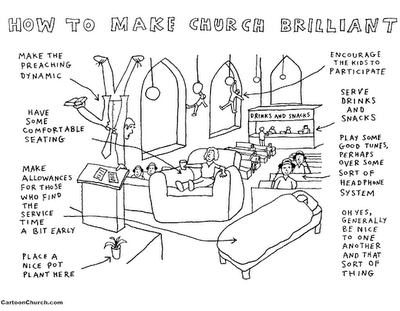As promised, today I'm posting some selective reflections on the time our presbytery leadership spent last week on retreat with
Dr. Paul Borden.
Borden is an American Baptist pastor who serves as the leader of one of that denomination's regional judicatories. We read his book
Hit the Bullseye as background for his presentation. Since the retreat was for our presbytery leadership, he focused on ways to develop the presbytery staff as consultants to plant healthy churches and transform existing congregations. These strategies can be (and have been) easily adapted for church leaders wanting to grow a healthy congregation. I recommend the book to those of you who are interested--it is a compelling and easy read. Dr. Borden has a good record of success transforming churches which gives his ideas credibility.
Borden is a proponent of tough love. His position is that making disciples must be the first priority -- it is more important than worship, education, fellowship or denominational principles. When he talks about growth, he is not talking about increase in number of members--what El Jefe calls "exchanging hostages" (receiving new members who were already Christians in another church)--but making disciples out of those who were previously not Christians. When Dr. Borden talks numbers, he is referring to worship attendance rather than membership. He believes that the Great Commission is the foremost obligation of the church.
Borden said many things that I have always thought, but never heard anyone else say:
- Too many churches are designed and structured to remain small and ineffective. We think too small.
- Too often peace is a higher value than mission, or anything else.
- Most pastors don't know how to effect transformation because they've never been trained to do it.
- Fellowship and shepherding must be programmed because making friends is far more important than being friendly.
- Congregations that are declining will not change until they become focused outward.
- If a church wants to grow it must staff and behave as if it were larger than it is
Borden also said a number of things that I hadn't heard before and found very challenging:
- Pastors should not be acting as "chaplains" for the congregation, but should focus on developing the leadership of the staff so the staff can develop the leadership of the laity. (See this excellent post by Jan Edmiston and the thoughtful discussion in the comments that expand on this subject.)
- Churches that are not making new disciples for Jesus Christ are not being faithful or healthy, no matter what else they are doing.
- A healthy church gives priority to the people who aren't there yet instead of the people who are.
Accountability is the key to the strategies that Borden advocates--the pastors and other church staff as well as the lay church leadership must be held accountable for well-defined goals. Those goals should include the number of UNCHURCHED people their ministry will reach this year for Jesus, how many leaders they will develop, and by what percentage their area of ministry will grow this year. Borden stresses that "you must marry responsibility with accountability."
It seems to me that the issue of accountability will be the most difficult obstacle to overcome. Accountability is something that churches of every denomination fail to apply to their pastors/priests/ministers, staff and lay leadership at every level. Too often the suggestion that performance standards should be agreed upon and implemented is successfully resisted by those who either fear them or fear the controversy that enforcing them might cause. Witness the congregations and denominations that reward pastors and denominational leaders despite loss of membership, revenue and withdrawal from mission. Or note the many times that ineffective and/or dysfunctional lay leaders remain in place because neither the pastors nor the other lay leaders will remove them. Effective systemic change will never happen unless we are willing to deal with some unpleasantness and pain along the way. The question is can we be tough enough to change, or are we satisfied to wring our hands and whine?
Dr. Borden's presentation did not gloss over the difficulties in the path of congregations that commit to following his strategies for transformation. He gave us way more to think about than I have included here. Dr. Borden's prescription would be a dose of salts for most of us, but maybe it's just what we need to move into the future making disciples for Christ instead of continuing our self-satisfied ways and wondering why the church continues its decline.
If I were the pastor of a church that committed to work with him and his principles, I would be mightily heartened and encouraged to have Paul Borden's assistance and counsel during the inevitable trip to the valley of the shadow that the process would bring. He is positive, convincing and very supportive of pastors, staff and lay leaders who engage in transformation. His presentation included lots of specific examples of creative ways that churches he worked with reached out to make disciples.
Because it would be difficult to re-structure an existing congregation in the way he advocates, I think that using these principles in the implementation of new church plants will prove to be the most productive strategy. I'm appointing a small group of those who attended to sift through all these ideas and recommend ways for New Covenant presbytery to tackle them--that may include exploring the idea of a joint "Growing Healthy Churches"/PCUSA church plant in this presbytery. Since New Covenant presbytery is training church transformation consultants this week, we will also want to consider integrating some of the GHC principles into our program--with special attention to Borden's emphasis on accountability.
Our retreat was very challenging and hopefully will prove to be very productive for us!








